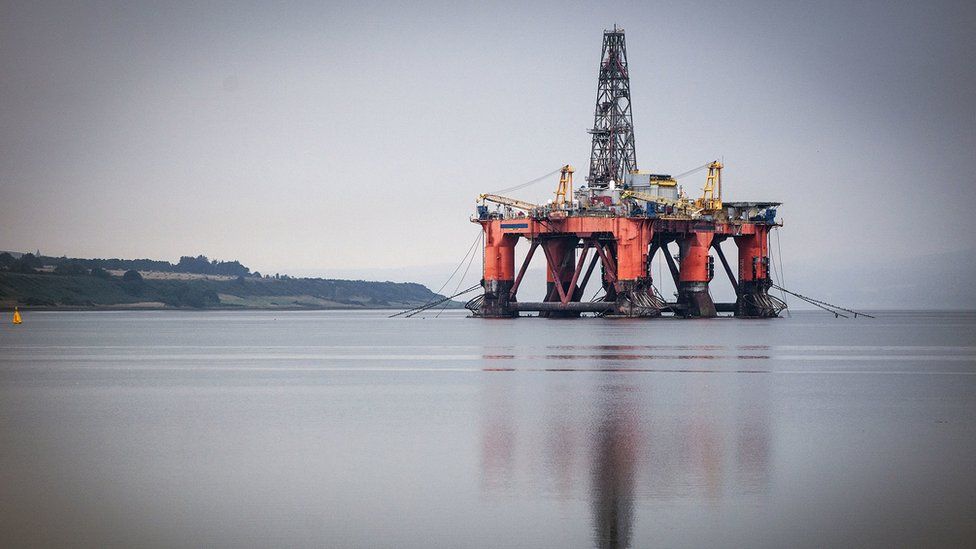ARTICLE AD BOX
 Image source, PA Media
Image source, PA Media
By James Cook
Scotland editor
Labour will end new North Sea oil and gas exploration, but help communities profit from clean power projects, Sir Keir Starmer is to pledge.
Speaking in Edinburgh later the Labour leader will vow to "cut bills, create jobs and provide energy security".
He will also announce a publicly-owned green energy company based in Scotland.
Sir Keir is under pressure from environmentalists and the oil industry over the scale and pace of Labour's planned transition to cleaner power.
Climate campaigners have criticised the party for rowing back on a pledge to invest £28bn a year in green industries.
In England, rules banning new onshore wind farm developments will be scrapped if Labour wins the next election.
Image source, Getty Images
Image caption,Labour is under pressure from unions and the oil industry over the scale of its planned transition
Labour has confirmed it would "not grant licences to explore new fields" in the North Sea, a momentous shift for a sector which supports 200,000 UK jobs, including 90,000 in Scotland, according to trade body Offshore Energies UK.
But the party insists it will honour any licences in existence at the time of the next election, which must be held by January 2025. That is likely to include the controversial new Rosebank development west of Shetland.
Sir Keir will say: "Labour will deliver lower bills, good jobs, and energy security for Scotland and the whole UK, as Britain leads the world in the fight against climate change."
One of Labour's initiatives will be to provide more incentives for everyone in a geographical area - whether that is big companies or individual households - to adopt clean energy, by ensuring that area will see any financial benefits.
Under Labour's plans, GB Energy - the new publicly-owned firm based in Scotland at a location yet to be decided - would play a key role in getting that message across.
It would oversee the return of profits from successful clean energy projects to local councils in those areas that adopt them. The councils could then use that income to reduce council tax, pay for improved public services or simply provide rebates on energy bills.
Labour says GB Energy could end up providing up to £600m per year to local councils to invest in green infrastructure and a further £400m annually in low interest loans for community projects.
These community loans would be designed to ensure small projects could benefit from the expertise of GB Energy while also generating money for local areas.
The ban against on-shore wind farms will be lifted if Labour wins the election
But Offshore Energy UK's chief executive David Whitehouse told the BBC that Labour's plans to move away from the reliance of North Sea oil and gas "would create a cliff edge". deterring investment and heightening the risk of energy shortages.
Mr Whitehouse said 180 of the North Sea's 283 active oil and gas fields were due to close by 2030, and new licences were "essential" or production would "plummet" and "the UK and its skilled workforce will be exposed".
When Scottish Labour leader Anas Sarwar discussed the proposals on the BBC's Sunday with Laura Kuenssberg, Sharon Graham, general secretary of the trade union Unite, responded on Twitter by calling his remarks "simply not acceptable," accusing UK Labour of a "total lack of detail", and adding "these throw away comments cost jobs".
But Philip Evans, of Greenpeace UK, said the idea that the plans would "lead to an overnight shutdown of the industry" was nonsense.
Labour's opposition to new exploration licences represented "genuine leadership" he added, and the party was right "to debunk scare stories being peddled by climate delayers".
'No backsliding'
Mike Childs, head of science, policy and research at Friends of the Earth, welcomed Labour's latest ideas but warned "there can be no backsliding on pledges to stop new oil and gas extraction and invest in green growth".
Environmental groups are particularly vocal about their opposition to the proposed Rosebank development in the North Atlantic.
Industry and government sources say the field could be approved by the UK government's North Sea Transition Authority within weeks.
Norwegian state-controlled oil company Equinor said Rosebank could produce almost 70,000 barrels of oil a day at its peak.
Sir Keir has held private talks with senior energy industry figures in the past week and previously gave direct assurances to Equinor that a Labour government would not revoke any licences.
Instead the party says its focus is on delivering "cheaper zero carbon power by 2030" and its "mission" includes plans to attract and incentivise investment "in the UK's industrial heartlands".
That is likely to provoke comparisons with the approach taken by the US Democratic president Joe Biden whose Inflation Reduction Act has been described by the UK Conservative government's Business Secretary Kemi Badenoch as "protectionist".
In a statement Sir Keir accused the Conservatives and the SNP of having abysmal records on renewables. "Labour will deliver lower bills, good jobs, and energy security for Scotland and the whole UK, as Britain leads the world in the fight against climate change," he said.
"The route to making Britain a clean energy superpower, slashing energy bills and creating tens of thousands of quality jobs runs through Scotland," Sir Keir added.
The Scottish Conservatives' energy spokesman Liam Kerr described Labour's plans as "ruinous" for the UK's oil and gas industry, claiming they "would throw up to 90,000 highly skilled workers in the North East under a bus pretty much overnight".
A Scottish government spokesperson said it was committed to "a planned and fair transition" away from fossil fuels that did not imperil jobs adding: "Simply stopping all future activity overnight is wrong.
"It could threaten energy security while destroying the very skills we need to transition to the new low-carbon economy."

 1 year ago
38
1 year ago
38








 English (US) ·
English (US) ·